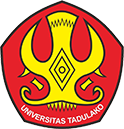The Meaning of Nonverbal Communication of Momasoro Traditional Ceremony in Ogoansam Village of Palasa, Parigi Moutong
DOI:
https://doi.org/10.22487/ejk.v11i2.1184Keywords:
Nonverbal meaning, Momasoro, Traditional ceremonyAbstract
Momasoro is a boat release, a ritual of the Lauje tribe that is carried out at the end of each year as a form of gratitude to the Creator who provides fertility for the crops and life for plants and animals. Momasoro is a means of treatment that is believed by the Lauje tribe. The results of the study indicate that the meaning of the nonverbal message contained in the Momasoro traditional ceremony procession of the Lauje Tribe is based on several aspects. Kinesics are seen from the movements and facial expressions of officers in the Momasoro traditional ceremony procession during the process of circling the boat while mogumbuy and when dancing Meaju to deliver the boat on the beach. Paralinguistics are seen from the mongganoy process (reading prayers using rhythm) accompanied by sinta, gong and dotolan musical instruments performed by one of the traditional elders in Ogoansam Village. Artifacts are seen from the equipment that has been provided by the traditional elders and the Lauje Tribe community in Palasa District.
Downloads
References
Aang Ridwan. 2016 Komunikasi Antar Budaya, bandung. Pustaka Setia.
Ana Andung, Petrus. 2010. Komunikasi Ritual Natoni Masyarakat Adat Boti Dalam di Nusa Tenggara Timur, Jurnal Ilmu Komunikasi Vol. 8. No. 1 http://ejournal.ilkom.fisip-unmul.ac.id/. (Diakses pada 2 Juni 2023. Pukul 10:00).
Bungin, Burhan. 2003. Analisis Data Penelitian Kualitatif. PT. Raja Grafindo persada. Jakarta.
Cangara, Hafied. 2012. Pengantar Ilmu Komunikasi. Terbitan ke-13. Jakarta: PT Raja Grafindo Persada.
Deddy Mulyana, 2000 Ilmu Komunikasi Suatu Pengantar, Bandung: Remaja Rosdakarya.
Depdikbud. 1984. Upacara Tradisional (Upacara Kematian) Daerah Kalimantan Timur, Jakarta: Balai Pustaka ditinjaudari: https://scholar.google.co.id/scholar. (Diakses pada 2 Juni 2023. Pukul 20:30 WITA).
Effendy, Onong Uchjana. 2003. Ilmu Komunikasi Teori dan Praktek, Remaja Rosdakarya. Bandung.
Hamid, Farid, dan Heri, Budianto 2011. Ilmu Komunikasi: Sekarang dan Tantangan Masa Depan, Kencana Prenada Media Group. Jakarta.
Koentjaraningrat, 2008. Manusia dan kebudayaan di indonesia. Djambatan.Jakarta
Kuntjara, Esther. 2006. Penelitian Kebudayaan Sebuah Panduan Praktis. Graha Ilmu. Yogyakarta.
Larry A. Samovar, Richard E, porter dan Edwin R.McDanield. 2007 Komunikasi Lintas Budaya. Jakarta:Salemba-humanika
Larry A.Samovar, Richad E.Porter, dan Edwin R.McDaniel, Komunikasi Lintas Budaya: Communication Between Cultures, Salemba Humanika, Jakarta, 2010:25.
Liliweri, Alo.2009. Dasar-Dasar Komunikasi Antar Budaya. Yogyakarta: Pustaka Pelajar.
Nasrullah, Rulli. 2012. Komunikasi Antarbudaya: Di Era Budaya Siberia. Kencana Pranamedia Group. Jakarta.
Purba, Bonaraja dkk. 2020. Ilmu Komunikasi Sebuah Pengantar. Medan: Yayasan Kita Menulis.
Rakhmat, Jalaludin. 2008, Psikologi Komunikasi, Bandung: Remaja Rosdakarya.
Sarungu, Lukas M. 2021. Pengantar (Singkat) Ilmu Komunikasi. Surakarta. UNISRI Press.
Sobur, alex. 2013. Semiotika komunikasi Terbitan ke -5. Bandung: PT Remaja Rosdakarya.
Sudikan, S.Y. 2001. Metode penelitian kebudayaan, Citra Wacana. Bandung







